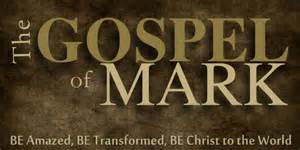
“They all ate and were satisfied”
Scripture: Mark 6:34-44
34 As he went ashore he saw a great throng, and he had compassion on them, because they were like sheep without a shepherd; and he began to teach them many things. 35 And when it grew late, his disciples came to him and said, "This is a lonely place, and the hour is now late; 36 send them away, to go into the country and villages round about and buy themselves something to eat." 37 But he answered them, "You give them something to eat." And they said to him, "Shall we go and buy two hundred denarii worth of bread, and give it to them to eat?" 38 And he said to them, "How many loaves have you? Go and see." And when they had found out, they said, "Five, and two fish." 39 Then he commanded them all to sit down by companies upon the green grass. 40 So they sat down in groups, by hundreds and by fifties. 41 And taking the five loaves and the two fish he looked up to heaven, and blessed, and broke the loaves, and gave them to the disciples to set before the people; and he divided the two fish among them all. 42 And they all ate and were satisfied. 43 And they took up twelve baskets full of broken pieces and of the fish. 44 And those who ate the loaves were five thousand men.
Meditation: Nothing can satisfy the deepest longing and desire of the heart, except God alone. Do you believe that is true? Of all the miracles Jesus did, this is the only one which is repeated in all four gospels. A great multitude had gathered to hear Jesus, no doubt because they were hungry for the word of life. Jesus’ disciples wanted to send them away at the end of the day because they did not have the resources to feed them. They even complained how much money it would take to feed such a crowd -- at least six month’s wages! Jesus took the little they had -- five loaves and two fish -- and giving thanks to his heavenly Father, distributed to all until they were satisfied of their hunger. They took up what was left over, twelve baskets full so that nothing would be wasted.
What is the significance of this miracle? The miraculous feeding of such a great multitude pointed to God's provision of manna in the wilderness for the people of Israel under Moses' leadership. This food foreshadowed the true heavenly bread which Jesus would offer his followers. Jesus makes a claim only God can make: He is the true bread of heaven that can satisfy the deepest hunger we experience. The feeding of the five thousand shows the remarkable generosity of God and his great kindness towards us. In the multiplication of the loaves and fishes we see a sign and a symbol of what God always does. When God gives, he gives abundantly. He gives more than we need for ourselves that we may have something to share with others, especially those who lack what they need. God takes the little we have and multiplies it for the good of others. Do you trust in God's provision for you and do you share freely with others, especially those who lack?
"Lord Jesus Christ, you satisfy the deepest longings of our hearts and you feed us with the finest of wheat (Psalm 81:16). Fill me with gratitude for your blessings and give me a generous heart that I may freely share with others what you have given to me."


.jpg)
.jpg)

.jpg)
.jpg)
.jpg)
.jpg)
